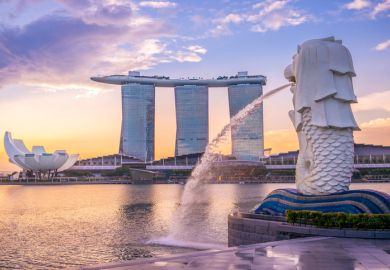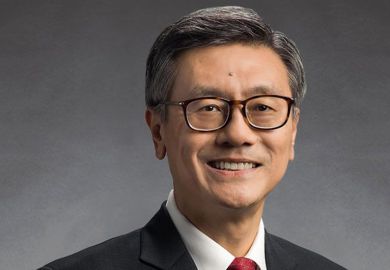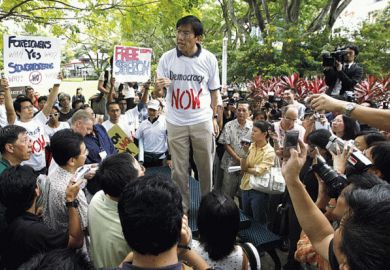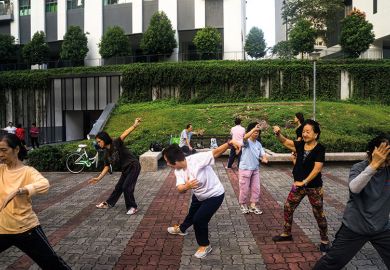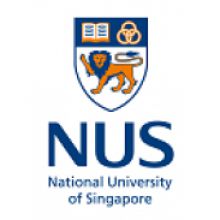The dismantling of a collaboration between two of the world’s top universities shows that liberal arts education cannot survive in Asia, critics said.
The National University of Singapore (NUS) has ruled out future admissions into Yale-NUS College, with the eight-year-old partnership set to end when the last students graduate in mid-2025. An as yet unnamed “New College” will be formed from Yale-NUS and the University Scholars Programme (USP), an elite multidisciplinary stream that was established 20 years ago and will now close in mid-2022. Continuing USP students will “transit” to the new college, joining a new intake of up to 500 others.
NUS says that the change will allow it to deliver “flexible, interdisciplinary education” more accessibly and at greater scale. “The evolution of USP and Yale-NUS into the New College…brings together the best features of both institutions and expands access to multiple pathways, disciplines and specialisations,” said NUS president Tan Eng Chye.
He said that the change was part of a broader suite of reforms enacted since 2018 to keep pace with the “global economy” by fostering interdisciplinarity.
It was reportedly announced in an online meeting on 27 August, after classes had been cancelled at short notice. Yale-NUS student publication The Octant described the development as a “planned catastrophe” with students and staff expressing shock, outrage and heartbreak.
The college’s Connecticut partners were also taken by surprise, with the Yale Daily News reporting that the Ivy League institution “was not the proponent of its dissolution”.
In a statement, Yale president Peter Salovey said that he had been informed of the plan in July. “In the eight years since the college admitted its first class, it has become one of the most highly selective institutions of higher learning in the world. We would have liked nothing better than to continue its development.”
Professor Salovey said that the college’s governing board would be maintained until the 2025 closure, with current students guaranteed “the full Yale-NUS experience”. He said that the college’s policy on academic freedom would also remain in place until 2025.
Mitchell Palmer, a second year undergraduate at Yale-NUS, scoffed at claims of a “merger” with USP. He said Yale-NUS was being abolished and ceding its purpose-built facilities to a fundamentally different type of institution.
“To expand access to the liberal arts in Singapore…is a laudable goal, but it is unclear why it necessarily implies the abolition of Yale-NUS College,” he blogged. “Even the hackneyed business school trope of eliminating duplication cannot explain this decision.
“The university which is consistently ranked the best in Asia cannot, in collaboration with an American university with hundreds of years of experience in liberal education, create a real liberal arts college that lasts more than a decade in full-scale operation. What hope does anyone else have?”
Singapore native Linda Lim, emeritus professor of corporate strategy at the University of Michigan, said that the reasons for the closure were hard to fathom. The college and its curriculum experienced “huge demand” from students willing to pay the considerable tuition fees. Its graduates attracted demand from local and international employers and the doctoral programmes of top universities such as Chicago, Michigan and Yale itself.
She attributed the closure to local resentment of “an elitist bastion of Western liberalism” that absorbed generous Singaporean funding. “The faculty is about 90 per cent foreign. The students are about 50 per cent foreign. It’s kind of galling. You’re in your own country, and there’s this rich foreign enclave that has all these freedoms and privileges,” she said.
Professor Lim, whose AcademiaSG collective recently conducted a survey of academic freedom in the city state, said political expression was also a likely root cause. She said Yale-NUS students had a reputation for political activism and the college had raised eyebrows by picking opposition leader Pritam Singh as keynote speaker at this year’s graduation ceremony.
In 2019, a planned course on “dissent and resistance in Singapore” was cancelled after the education minister complained about universities becoming a venue for “partisan political activities to sow dissent against the government”.
Professor Lim said that doubts about the viability of Western-style liberal education in the city state had accompanied the college’s establishment. “Yale students, faculty and alumni thought that partnering with Singapore – an authoritarian state with not a very good record of academic or media freedom of expression – would sully Yale’s reputation.”
NUS said that Yale-NUS had fostered “open inquiry within a context of respect for differences of opinion and for academic freedom. The New College, like NUS, will also value academic freedom and support non-discrimination.”
POSTSCRIPT:
Print headline: Is there a future for liberal arts in Asia?
Register to continue
Why register?
- Registration is free and only takes a moment
- Once registered, you can read 3 articles a month
- Sign up for our newsletter
Subscribe
Or subscribe for unlimited access to:
- Unlimited access to news, views, insights & reviews
- Digital editions
- Digital access to THE’s university and college rankings analysis
Already registered or a current subscriber?

